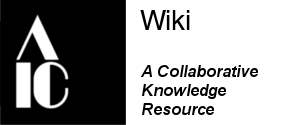Using Composite Panels for Exhibit Case Construction
Back to complete list of Exhibit Technical Notes
A number of particleboards made without formaldehyde resins can be used to build exhibit cases, as long as the surface is sealed to prevent acidic outgassing and migration.
What are composite panels?[edit | edit source]
Hardboard is made for siding, paneling and underlayment and is composed of wood fibers. Phenol-formaldehyde resins are most often employed. Oriented Strand Boards (OSB) have strands of wood directionally oriented and are similar to, but not the same as Waferboard which has randomly aligned strands. Phenol-formaldehyde and some isocyanate resins are employed.
Of the four major types of composition panels, only two are practical for exhibit case construction.
- Particleboard: made from particles of waste wood mostly adhered by urea-formaldehyde resin; used for underlayment, cabinets, furniture and stairs.
- Medium-density fiberboard (MDF): composed of wood fibers mostly adhered by urea-formaldehyde resins; used for cabinets, furniture and moldings.
Most particleboard and MDF present conservation concerns because of their urea-formaldehyde resin content.
Are any composite boards acceptable for exhibit case construction?[edit | edit source]
There are voluntary standards for particleboards and MDFs. Particleboard standards ANSI A208.1-1993 allow up to a 0.20 ppm formaldehyde emission level for certain products. MDF standards ANSI A208.2-1994 allow up to a 0.30 ppm emission level. Several manufacturers produce specialized boards using either a phenol-formaldehyde resin or a polymeric diisocyanate adhesive system, both of which emit very little formaldehyde.
The following composite boards are rated as low emission products; others may also meet low emission levels.
- Particleboard: Resincore I (manufactured by Rodman Industries) is a homogeneous wood particleboard bonded with phenol formaldehyde resin. The manufacturer reports volatile formaldehyde emissions of approximately 0.04 ppm based on the ASTM large chamber test.
- Medium-density fiberboard: Medite II and Medex (manufactured by the Medite Corporation) use formaldehyde-free adhesive systems.
- Medite II is an interior fiberboard made from mixed softwoods and formaldehyde-free polymeric methylene diisocyanate (pMDI). The manufacturer reports a formaldehyde emission level of less than 0.01 ppm. It has the same physical characteristics as other fiberboards and can be easily machined, cut and sanded.
- Medex is a medium-density fiberboard originally designed for exterior uses such as road signs. It contains mixed softwoods bonded with isocyanates and small amounts of paraf-finic wax and mineral wax. It is heavier than plywood, 15 -20% stronger than Medite II, and has a smooth surface. Since it is an exterior fiberboard, it is more water repellent than Medite II. The manufacturer reports volatile emissions levels less than 0.01 ppm.
Are protective coating and laminates necessary for low-emitting composite panels?[edit | edit source]
Because particleboard and fiberboard contain wood chips and sawdust, the potential for airborne acidic emission is considerable. Any of these boards used to construct exhibits should be well-sealed on the interior and end grain surfaces or isolated through the use of barrier films, sealant coatings or laminates. Because the boards are absorbent, do not store specialized particleboard and MDF with products that can emit any significant amount of formaldehyde.
For more information about particleboard and MDF products contact:[edit | edit source]
- The Engineered Wood Association (APA) - Tacoma, WA
- Composite Panel Association - Gaithersburg, MD
- USDA-FS Forest Products Laboratory - Madison, WI
Products, Manufacturers, and Suppliers[edit | edit source]
Mention of a product, manufacturer, or supplier by name in this publication is for information only and does not constitute an endorsement of that product or supplier by the National Park Service. Listed materials have been used successfully in past applications. It is suggested that readers also seek alternate product and vendor information to assess the full range of available supplies and equipment.
- Resincore - Rodman Industries, Marinette, Wisconsin
- Medite II and Medex - Medite Corporation , Medford, Oregon
